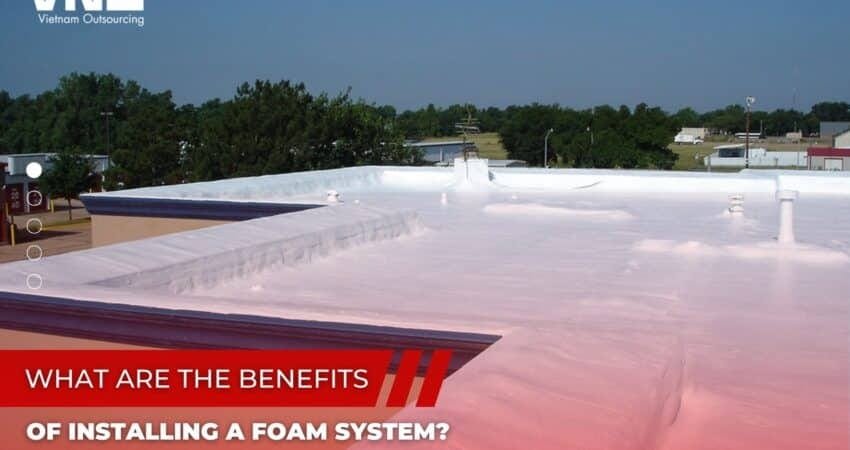As a versatile and cost-effective option for residential and commercial properties, foam roofing systems have grown in popularity. Utilizing a high-density polyurethane foam, this roofing technique offers a number of advantages that make it an attractive choice for a variety of roofing applications. This exhaustive guide will examine the benefits of installing a foam roofing system, from its superior insulating properties to its energy-saving and long-lasting qualities. If you’re considering a new roof or roof replacement, continue reading to learn why polystyrene roofing may be the best option for your home.

Superior Thermal Insulation
The extraordinary insulation properties of a foam roofing system are among its most important advantages. Foam roofs produce a seamless and continuous layer that effectively insulates the building, forming a thermal barrier that keeps the interior cool in the summer and toasty in the winter. This insulation improves the building’s comfort and reduces the need for heating and cooling systems, resulting in significant energy savings.
Lightweight and Versatile
Compared to conventional roofing materials like asphalt shingles or concrete tiles, foam roofing systems are incredibly lightweight. Due to their light weight, foam roofs are appropriate for both new construction and roof replacement, as they place less strain on the building’s structure. In addition, foam roofing can be applied to a variety of roof shapes and contours, making it an adaptable choice for roofs with intricate designs or irregular surfaces.
Unbroken and watertight
Foam roofing is applied as a liquid that expands and hardens to form a single, continuous layer. This seamless application eliminates the risk of leaks and water-related damage by ensuring there are no joints, seams, or openings where water can infiltrate. The absence of seams also diminishes the likelihood of pests entering the building through the roof.
Superior Strength and Longevity
When properly installed and maintained, foam roofing systems have proven to be extremely resilient and long-lasting. The foam’s closed-cell structure provides exceptional resistance to weathering, ultraviolet light, and temperature fluctuations. As a result, foam roofs can withstand severe environmental conditions, such as heavy rainfall, strong winds, and intense heat, without losing their structural integrity.
Durable and Environmentally Responsible
Due to their ability to reduce energy consumption and waste, foam roofing systems are considered environmentally beneficial. Foam roofs reduce the building’s carbon footprint by reducing the need for constant heating and ventilation. In addition, foam roofing can be installed over existing roofs, eliminating the need for the removal and disposal of old roofing materials, thereby reducing landfill waste.
Simple upkeep and repairs
A foam roofing system is simple and cost-effective to maintain. Regular inspections and minimal maintenance can significantly extend the roof’s lifespan. In the event of damage, it is simple to conduct restorations by reapplying the foam and coating materials. The ability to perform localized repairs as opposed to replacing the entire roof reduces the roof’s long-term maintenance costs even further.
Energy Efficiency and Savings Costs
As mentioned previously, the superior insulation properties of foam roofing contribute to significant energy savings. By stabilizing domestic temperatures and reducing reliance on heating and cooling systems, property owners can realize significant energy bill reductions. The initial investment in a foam roofing system is also offset by long-term cost reductions resulting from reduced energy consumption and maintenance costs.
Enhancement of Indoor Air Quality
In addition to providing excellent thermal insulation, foam roofing systems also serve as an effective air barrier. Foam roofs contribute to enhanced indoor air quality by preventing air leakage and sealing the roof. This airtightness can prevent outdoor pollutants, pollen, and allergens from entering the building, thereby creating a healthier living or working environment for the occupants.
Conclusion
Numerous advantages make a foam roofing system an attractive option for both residential and commercial properties. Foam roofs offer a number of advantages that traditional roofing materials cannot match, including their superior insulation properties, durability, energy efficiency, and environmental benevolence. The seamless and watertight application of foam roofing assures a durable, leak-free roof, while its lightweight and adaptable nature makes it suitable for a variety of roof designs and shapes.
If you are searching for an innovative, cost-effective, and environmentally friendly roofing system, a foam roofing system may be the best option for your home. With proper installation and maintenance, a foam roof can provide long-lasting protection, improve energy efficiency, and provide long-term cost savings, making it a worthwhile investment for any building owner. Consult with professional roofing contractors to determine if a foam roofing system meets your particular roofing requirements.


